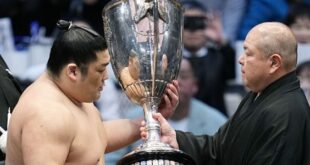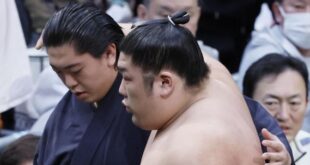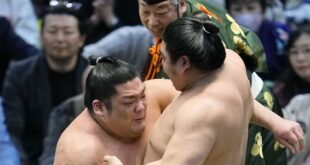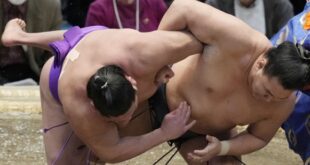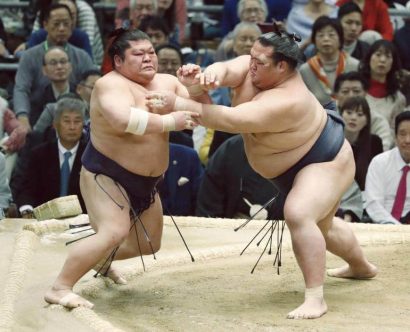
Les yokozuna Hakuho et Harumafuji déjà défaits
Kisenosato a fait un bon démarrage pour ses débuts en tant que yokozuna dimanche en s’imposant face au maegashira 1 Takekaze lors de la première journée du Grand tournoi de sumo de printemps.
Le nouveau yokozuna japonais n’a seulement eu besoin que de quelques coups rapides pour battre Takekaze par oshidashi.
Kisenosato, qui a été promu en janvier dernier devenant ainsi le premier grand champion japonais depuis Wakanohana en 1998, a remporté pour la 25e fois son combat contre Takekaze. Demain, Kisenosato fera face au komusubi Shodai.
Depuis 1949 où les tournois de sumo se déroulent sur 15 jours, seulement trois lutteurs ont remporté le tournoi dès leur promotion au rang de yokozuna – Taiho, Takanosato et Takanohana.
Cela fait 17 ans qu’il n’y a pas eu quatre yokozuna dans la même compétition, la dernière fois remonte en 2000 avec Akebono, Takanohana, Wakanohana et Musashimaru.
Shodai a donné un avertissement à Kisenosato qu’il rencontrera lundi, en battant pour la première fois Hakuho.
Shodai a réussi à rester agrippé à la ceinture de Hakuho avant de réussir à déséquilibrer le Mongol et à le projeter à terre. Le yokozuna est resté quelque peu abasourdi par sa première défaite.
« J’y suis allé en essayant de combattre seulement comme je sais le faire« , a déclaré Shodai. « Je ne l’ai pas laissé me pousser. Je suis très heureux de cette victoire« .
Harumafuji a également obtenu sa première défaite face à Kotoshogiku. Le sekiwake a besoin de 10 victoires pour retrouver son ancien grade d’ôzeki.
Kakuryu a sauvé la face en gagnant contre le komusubi Mitakeumi pour la troisième fois en quatre rencontres
Dans les autres matchs remarquables, les deux ôzeki se sont facilement imposés. Après avoir manqué le tournoi du Nouvel An en raison de blessures, Goeido a fait son retour avec une victoire écrasante sur le maegashira 1 Ikioi, tandis que Terunofuji a évincé Sokokurai.
Click on the title bellow for article in English :
Kisenosato marks yokozuna debut with win over Takekaze
Kisenosato won his yokozuna debut with ease Sunday, barreling out top-ranked maegashira Takekaze on the opening day of the Spring Grand Sumo Tournament.
Sumo’s latest grand champion, the 69th in the sport’s history, only needed a few quick shoves to beat Takekaze by oshidashi before a full house at Edion Arena Osaka.
Kisenosato, who became the first Japan-born yokozuna since Wakanohana in 1998 after capturing the New Year tournament in January, took his career record against Takekaze to 21-5 and will face komusubi Shodai on Monday.
Since sumo went to 15-day meets in 1949, only three wrestlers have won a tournament in their yokozuna debut — Taiho, Takanosato and Takanohana.
Sumo has not had four grand champions competing at one tourney in 17 years, not since Akebono, Takanohana, Wakanohana and Musashimaru fought at the 2000 spring basho.
The fortunes for the three yokozuna other than Kisenosato — Hakuho, Harumafuji and Kakuryu — varied Sunday.
Shodai fired a warning shot at Kisenosato by recording his first career victory over Hakuho, who went down meekly at the hands of his opponent.
Shodai succeeded in keeping Hakuho off his belt before throwing the Mongolian off balance and thrusting him to the dirt, where Hakuho looked absolutely stunned.
« I went all out trying to wrestle the only way I know how to wrestle, » said Shodai, who defeated Hakuho in his third try. « I didn’t let him push me around. I’m really happy with this win. »
Harumafuji also got off on the wrong foot, losing at the hands of sekiwake Kotoshogiku, who improved his lifetime record against the Mongolian to 32-27.
Kakuryu managed to save face with his third win in four bouts against komusubi Mitakeumi.
In other notable matchups, the two ozeki in the field both prevailed. After missing the New Year basho due to injury, Goeido marked his return with a victory over top-ranked maegashira Ikioi, while Terunofuji ousted No. 2 Sokokurai.
Written by Kyodo
Crédits photo : Asahi
- Makuuchi
- Juryô
|
Rikishis
|
Kimarites
|
Rikishis
|
|
Nishikigi
錦木 (Maegashira 16) 0-1 |
 |
|
yorikiri
寄り切り |
|
 |
Chiyootori
千代鳳 (Juryô 1) 1-0 |
|
Chiyoo
千代皇 (Maegashira 15) 0-1 |
 |
|
yorikiri
寄り切り |
|
 |
Tokushôryû
徳勝龍 (Maegashira 15) 1-0 |
|
Myogiryu |
 |
|
yorikiri
寄り切り |
|
 |
Kyokushuho
旭秀鵬 (Maegashira 14) 0-1 |
|
Takakeisho
貴景勝 (Maegashira 13) 0-1 |
 |
|
oshidashi
押し出し |
|
 |
Daishomaru
大翔丸 (Maegashira 13) 1-0 |
|
Sadanoumi
佐田の海 (Maegashira 12) 0-1 |
 |
|
oshidashi
押し出し |
|
 |
Ura
宇良 (Maegashira 12) 1-0 |
|
Ishiura
石浦 (Maegashira 11) 0-1 |
 |
|
yorikiri
寄り切り |
|
 |
Tochiôzan
栃煌山 (Maegashira 10) 1-0 |
|
Tochinoshin
栃ノ心 (Maegashira 10) 0-1 |
 |
|
oshidashi
押し出し |
|
 |
Daieisho
大栄翔 (Maegashira 11) 1-0 |
|
Kagayaki
輝 (Maegashira 9) 0-1 |
 |
|
hikiotoshi
引き落とし |
|
 |
Kotoyuki
琴勇輝 (Maegashira 9) 1-0 |
|
Okinoumi
隠岐の海 (Maegashira 8) 0-1 |
 |
|
uwate hineri
上手捻り |
|
 |
Chiyoshoma
千代翔馬 (Maegashira 7) 1-0 |
|
Ichinojo |
 |
|
oshidashi
押し出し |
|
 |
Aoiyama
碧山 (Maegashira 6) 0-1 |
|
Chiyonokuni
千代の国 (Maegashira 6) 0-1 |
 |
|
yorikiri
寄り切り |
|
 |
Hokutofuji
北勝富士 (Maegashira 5) 1-0 |
|
Endo
遠藤 (Maegashira 5) 1-0 |
 |
|
yorikiri
寄り切り |
|
 |
Arawashi |
|
Yoshikaze
嘉風 (Maegashira 4) 0-1 |
 |
|
tsukiotoshi
突き落とし |
|
 |
Takarafuji |
|
Shôhôzan
松鳳山 (Maegashira 3) 0-1 |
 |
|
yorikiri
寄り切り |
|
 |
Takayasu
高安 (Sekiwake) 1-0 |
|
Tamawashi
玉鷲 (Sekiwake) 1-0 |
 |
|
tsukiotoshi
突き落とし |
|
 |
Takanoiwa
貴ノ岩 (Maegashira 2) 0-1 |
|
Sokokurai
蒼国来 (Maegashira 2) 0-1 |
 |
|
yorikiri
寄り切り |
|
 |
Terunofuji
照ノ富士 (ôzeki) 1-0 |
|
Gôeidô
豪栄道 (ôzeki) 1-0 |
 |
|
uwate dashinage
上手出し投げ |
|
 |
Ikioi
勢 (Maegashira 1) 0-1 |
|
Takekaze
豪風 (Maegashira 1) 0-1 |
 |
|
oshidashi
押し出し |
|
 |
Kisenosato
稀勢の里 (Yokozuna) 1-0 |
 |
|
oshidashi
押し出し |
|
 |
Kotoshôgiku
琴奨菊 (Sekiwake) 1-0 |
|
|
Mitakeumi
御嶽海 (Komusubi) 0-1 |
 |
|
shitate dashinage
下手出し投げ |
|
 |
Kakuryû
鶴竜 (Yokozuna) 1-0 |
|
Hakuhô
白鵬 (Yokozuna) 0-1 |
 |
|
tsukiotoshi
突き落とし |
|
 |
Shodai
正代 (Komusubi) 1-0 |
|
DOSUKOI.FR -Le site français du sumo
|
|
Rikishis
|
Kimarite
|
Rikishis
|
|
Amuru |
 |
|
tsukiotoshi
突き落とし |
|
 |
|
|
Terutsuyoshi
照強 (Juryô 14) 1-0 |
 |
|
oshidashi
押し出し |
|
 |
|
|
Asahishô |
 |
|
hatakikomi
叩き込み |
|
 |
Aminishiki
安美錦 (Juryô 12) 1-0 |
|
Asanoyama
朝乃山 (Juryô 12) 1-0 |
 |
|
oshidashi
押し出し |
|
 |
Kitaharima
北磻磨 (Juryô 11) 0-1 |
|
Kitataiki
北太樹 (Juryô 11) 0-1 |
 |
|
yorikiri
寄り切り |
|
 |
Seiro
青狼 (Juryô 10) 1-0 |
|
Satoyama
里山 (Juryô 10) 0-1 |
 |
|
uwatenage
上手投げ |
|
 |
|
|
Daiamami
大奄美 (Juryô 9) 1-0 |
 |
|
okuridashi
送り出し |
|
 |
Ryuden
竜電 (Juryô 8) 0-1 |
|
Tsurugisho
剣翔 (Juryô 8) 0-1 |
 |
|
yoritaoshi
寄り倒し |
|
 |
Amakaze
天風 (Juryô 7) 1-0 |
|
Osunaarashi
大砂嵐 (Juryô 7) 1-0 |
 |
|
oshidashi
押し出し |
|
 |
Kyokutaisei
旭大星 (Juryô 6) 0-1 |
|
Yamaguchi
山口 (Juryô 6) 1-0 |
 |
|
okuridashi
送り出し |
|
 |
Homarefuji
誉富士 (Juryô 5) 0-1 |
|
Kotoeko
琴恵光 (Juryô 5) 0-1 |
 |
|
oshidashi
押し出し |
|
 |
Oyanagi |
|
Chiyomaru |
 |
|
yorikiri
寄り切り |
|
 |
Toyohibiki
豊響 (Juryô 3) 1-0 |
|
Hidenoumi
英乃海 (Juryô 3) 0-1 |
 |
|
okuridashi
送り出し |
|
 |
Onosho
阿武咲 (Juryô 2) 1-0 |
|
Gagamaru
臥牙丸 (Juryô 2) 1-0 |
 |
|
yorikiri
寄り切り |
|
 |
Chiyotairyû
千代大龍 (Juryô 1) 0-1 |
 Dosukoi, le site du sumo Sumo : actualités, résultats, dossiers, vidéos… toute la passion du sumo est sur Dosukoi!
Dosukoi, le site du sumo Sumo : actualités, résultats, dossiers, vidéos… toute la passion du sumo est sur Dosukoi!
